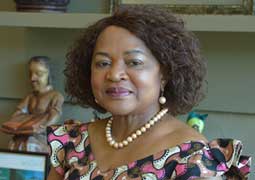
Presenting Parliament’s 2017/18 Budget Vote predicated on the “Celebration of 20 years of the Constitution and 20 years since the establishment of the NCOP”, the Speaker of the National Assembly, Ms Baleka Mbete, stated that although much has been achieved since the dawn of our democracy, much still needs to be done.
“The recent reports released by Statistics South Africa point to the fact that whilst we have made progress in some areas, much still remains to be done to address the challenges of poverty, inequality and participation of the marginalised in the mainstream of the economy,” she said.
“We must draw our strength in addressing these challenges from the wisdom of our courageous forebears such as Oliver Tambo. “The impetus to see our vision realised draws its inspiration not only from the Freedom Charter and the Constitution of the Republic, but also finds its inspiration from the lives and sacrifices of the heroes such as Oliver Reginald Tambo,” she said.
Most of all, he is regarded as one of the architects of our Constitution. We must adopt his inspiration to remain resolute and committed to building a South African nation that is diverse and that truly represents his ideals. As Parliamentarians, we have a responsibility to find solutions to the challenges facing our people, but we have to do so in a manner that acts as an example to the people we represent, she maintained.
In this current parliamentary tenure we have seen a number of contentious debates on key issues that resonate with the people of South Africa. Issues which feature prominently in the National Development Plan, one of which is the land question, she said. “The stripping away of the dignity of African people who trace their current suffering and deprivation back to the stealing of our land. Our people have long alerted us to their frustration on the matter of land reform and it is time that we listen to their voices, she said.”
To address this, Parliament will embark on a major oversight process or inquiry on land to help accelerate the land reform process, she said. But also without a strong legislative sector, we will not achieve much. Hence there is a need to strengthen its capacity to hold the executive to account, she said. “As such, Parliament has worked collectively with the provincial legislatures under the auspices of the Speakers’ Forum, to accelerate the drafting of the Legislative Sector Bill for the formalisation of the South African legislative sector as a coherent and unified sector to conduct its oversight and strengthen its public participation models.”
The 201718 budget of Parliament stands at R2.2bn, but given the critical role that Parliament must play in ensuring that there is proper accountability by the executive in promoting our democracy, the current budget falls desperately short of its legislative expectations, she said. “There is therefore a need to review the current practice of how Parliament is funded as it remains disadvantaged by the current funding model. The budget of Parliament, which is a distinct arm of State, cannot be decided in the same way as that of government departments.
“Speaker, we propose that as we pass this budget we must earnestly interrogate whether the framework of Parliament’s funding is in the keeping with our democratic values,” said the Chief Whip of the African National Congress Caucus at Parliament, Mr Jackson Mthembu.
“We are an arm of the State, not an entity of the State. And as long as we are under-resourced, our injunction to hold the executive accountable will remain a pipe dream,” he said.
To illustrate this further, he made a comparison between the skill sets of government departments and the Portfolio Committees. “The skills profiles of the departments consist of Directors-General and Deputy Directors-General with exceptional skill sets. They even go on to outsource technical skills to enhance their work. Committees are expected to meet the expertise of these officials while our Portfolio Committees remain under-resourced and lack specialised researchers. This is a misnomer,” he said.
“Speaker, you must approach the President to address the inadequate funding of Parliament,” he emphasised.
There are often complaints over judicial overreach, this concern would not arise if Parliament was doing its job, said Mr Michael Waters. “There would be no need to seek justice in courts if Parliament was playing its role effectively. We go to courts to defend our Constitution against all odds,” he said.
We reject this Budget Vote because Parliament has unnecessary capacity, intrinsic oversight mechanism and no strong financial management systems, said Mr Floyd Shivambu.
“What happens is that it is the executive which drafts legislation. Parliament does not initiate legislation. Perhaps that is the case because it has no intrinsic capacity to draft and initiate legislation. Parliament needs a legislation office to strengthen its legislative capacity,” he said.
On oversight, he decried the absence of forensic competency in Parliament’s oversight model which has, according to him, diminished its effectiveness.
According to Mr Temba Godi, Parliament must be the leading light of good governance. “To achieve that, Parliament must fight against irregular expenditure and hold officials involved in mismanagement,” he said.
But most of all, he called on Ministers to take responsibility of the affairs of their departments and stay away from procurement issues and tenders.
In support of the Chief Whip of the Majority Party in Parliament, Mr Jackson Mthembu, the Speaker of the National Assembly, Ms Baleka Mbete, stated that the need for equitable funding for Parliament cannot be overemphasised. “Part of our to-do-list is to engage the Head of State and the Minister of Finance,” said the Speaker in her reply.
“We want to determine how the funding of the legislative sector can be provided for, not as another ministry, but as another arm of the State.”
By Abel Mputing
30 May 2017

